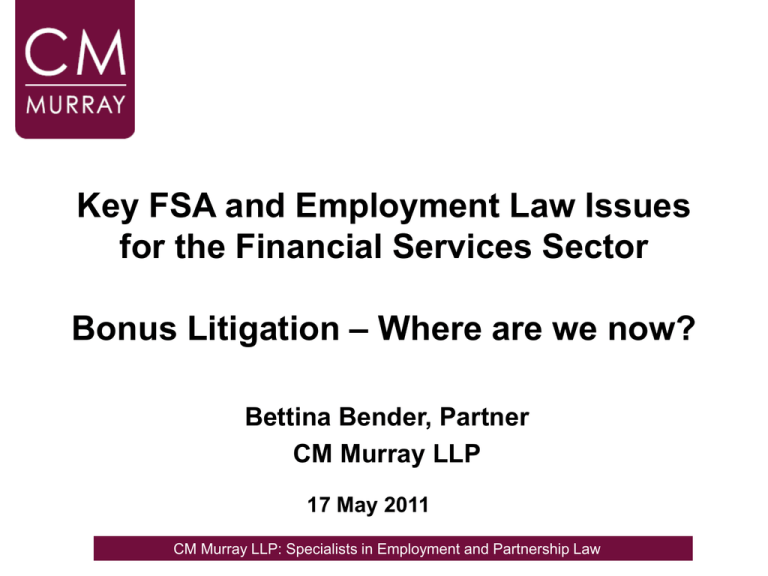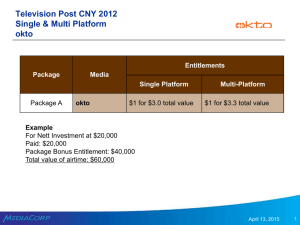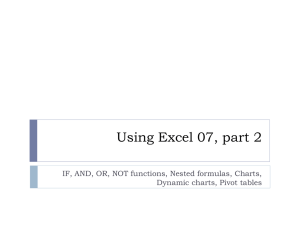
Key FSA and Employment Law Issues
for the Financial Services Sector
Bonus Litigation – Where are we now?
Bettina Bender, Partner
CM Murray LLP
17 May 2011
CM MurrayCM
LLP:
Murray
Specialists
LLP: Specialists
in Employment,
in Employment
Partnership
and
and
Partnership
Business Immigration
Law
Law
Bonuses
• Banking and Financial Services Sector: a different pay structure is
typical
• Comparatively low base with large bonus, although this is shifting
• Why is this contentious?
• Recent banking crisis – large bonus culture blamed for excessive
risk taking
CM MurrayCM
LLP:
Murray
Specialists
LLP: Specialists
in Employment,
in Employment
Partnership
and
and
Partnership
Business Immigration
Law
Law
Why pay a Bonus?
• A Reward for Performance
• A Guaranteed Bonus
e.g. Signing on Bonus, Retention Bonus
– to attract and retain key performers; often agreed to compensate
employees for leaving deferred incentive arrangement at previous
employer
– NB FSA Remuneration Code
CM MurrayCM
LLP:
Murray
Specialists
LLP: Specialists
in Employment,
in Employment
Partnership
and
and
Partnership
Business Immigration
Law
Law
The Performance Bonus
• Is it contractual?
• Is it discretionary?
• N.B. a discretionary bonus can become contractual over
time
• Is it a hybrid? (there is a contractual entitlement but the
amount payable is discretionary)
CM MurrayCM
LLP:
Murray
Specialists
LLP: Specialists
in Employment,
in Employment
Partnership
and
and
Partnership
Business Immigration
Law
Law
Issues to look for
• Does a Bonus Plan exist
• What does the Contract/Staff Handbook say
• What is the Bonus Year
• When is the Bonus declared
• When is the Bonus payable
• Forfeiture provisions
CM MurrayCM
LLP:
Murray
Specialists
LLP: Specialists
in Employment,
in Employment
Partnership
and
and
Partnership
Business Immigration
Law
Law
Bonuses and Exercise
of Discretion
Case Law to Date – A Recap
CM MurrayCM
LLP:
Murray
Specialists
LLP: Specialists
in Employment,
in Employment
Partnership
and
and
Partnership
Business Immigration
Law
Law
Lavarack v Woods of Colchester Ltd
[1967] 1 QB 278, [1966] 3 All ER 683, CA
Facts:
L was employed by W Ltd for a term of 5 years from 1 April 1962 on a basic
salary and such bonus (if any) as the directors “shall from time to time
determine”. On 27 July 1964 L was dismissed. In 1965 the company
revised their salary structure, ending the bonus scheme. L claimed wrongful
dismissal claiming damages for loss of salary under the contract and an
additional sum representing the salary increase he would have received had
he not been terminated.
Held (CA):
A dismissed employee could not seek compensation for loss of benefits to
which he was not contractually entitled and the employee was not entitled to
claim the sum he would have received by way of increase in salary in lieu of
bonus.
CM MurrayCM
LLP:
Murray
Specialists
LLP: Specialists
in Employment,
in Employment
Partnership
and
and
Partnership
Business Immigration
Law
Law
Clark v BET plc
[1997] IRLR 348
Facts:
C had a contract which provided that he would participate in a bonus
arrangement providing a maximum of 60% of salary in any year. C was
dismissed and claimed compensation in respect of salary increases and
bonus payments he would have earned during his 3 year notice period.
Held (High Court):
The Court was prepared to include anticipated salary increases and bonus
payments when calculating damages in respect of the notice period. A
discretion to award a bonus should not be exercised 'capriciously’.
CM MurrayCM
LLP:
Murray
Specialists
LLP: Specialists
in Employment,
in Employment
Partnership
and
and
Partnership
Business Immigration
Law
Law
Clark v Nomura International plc
[2000] IRLR 766, QBD
Facts:
C was employed as senior proprietary trader in equities with a discretionary
bonus scheme, based on individual performance. On 13 February 1997, NI
dismissed C on 3 months’ notice to be served as garden leave but paid him
no bonus on the bonus payment date of 25 April.
Held (High Court):
Whilst the dismissal itself was not wrongful, the discretionary bonus would
have been due for payment during the notice period (the employee might
have expected to receive £1.35m). There would be a breach of contract in
relation to an unfettered and absolute discretion if no reasonable employer
would have exercised the discretion in that way. This is the test of
‘irrationality and perversity’.
CM MurrayCM
LLP:
Murray
Specialists
LLP: Specialists
in Employment,
in Employment
Partnership
and
and
Partnership
Business Immigration
Law
Law
Horkulak v Cantor Fitzgerald
International [2004] EWCA Civ 1287
Facts:
Mr Horkulak was promoted to Senior Managing Director in August 1999 on
a 3 year fixed term contract with discretionary bonus. He resigned in June
2000 claiming constructive dismissal, on the basis of the bullying behaviour
of the President of CF.
Held (CA):
• A term will be implied into an employment contract that a discretion will be
exercised bona fide and rationally. Lord Justice Potter said to do otherwise
would to fly in the face of principles of trust and confidence which have been
held to underpin the employment relationship. Mr Horkulak was on a 3 year
fixed contract. If this contract had been lawfully performed, he would still
have been in employment at the time the bonuses were payable.
• Distinguished from Lavarack v Woods as Mr Horkulak was already entitled
to a bonus payment under his scheme.
CM MurrayCM
LLP:
Murray
Specialists
LLP: Specialists
in Employment,
in Employment
Partnership
and
and
Partnership
Business Immigration
Law
Law
Commerzbank AG v Keen
[2007] IRLR 132
Facts:
Mr Keen was head of the proprietary trading desk for just under three years
and was made redundant in June 2005. He participated in a discretionary
bonus scheme (with forfeiture provision). His claim was for underpaid
bonuses for 2003 and 2004 and non-payment for 2005.
Held (CA):
• Employers do have a wide discretion but this must not be irrationally,
perversely or arbitrarily exercised. The burden of establishing that no
rational bank would have exercised their discretion in a certain way was a
very high one.
•
UCTA 1977, s.3 does not apply to employment contracts at least insofar as
they apply to bonuses (employee not consumer)
CM MurrayCM
LLP:
Murray
Specialists
LLP: Specialists
in Employment,
in Employment
Partnership
and
and
Partnership
Business Immigration
Law
Law
Humphreys v Norilsk Nickel International
(UK) Ltd High Court
(QBD) [2010] EWHC 1867
Facts:
Dr Humphreys was employed as chief economist and entitled to an annual
bonus based on a grading by senior management of his performance.
When his fixed term contract came to end he was not paid any bonus on the
basis of his performance and in particular that he failed to predict Nickel
price changes, leading to losses for the company. Dr Humphreys had
argued that no-one could have foreseen price changes caused by the global
financial crisis.
Held: (High Court)
The court dismissed Dr Humphreys’ claim holding that the employer’s
decision not to pay him a bonus was a rational decision, taking in account
the group’s financial decline and Dr Humphreys inaccurate forecasts which
had been a contributing factor.
CM MurrayCM
LLP:
Murray
Specialists
LLP: Specialists
in Employment,
in Employment
Partnership
and
and
Partnership
Business Immigration
Law
Law
Bonuses and Contractual
Entitlements
Case Law to Date – A Recap
CM MurrayCM
LLP:
Murray
Specialists
LLP: Specialists
in Employment,
in Employment
Partnership
and
and
Partnership
Business Immigration
Law
Law
Fish and others v Dresdner Kleinwort
Ltd [2009] EWHC 2246 (QB)
Facts:
The 5 Claimants were part of the senior management team of DK. DK was
due to be sold to Commerzbank. To retain key staff they were notified of
their bonus payments for 2008. Due to the financial crisis the purchase
price was renegotiated and sale brought forward to Jan 2009. Severance
agreements were negotiated with the Claimants. The new management
then substantially reduced the 2008 bonus awards due to the dire financial
outlook. The Claimants were asked to give up their severance payments
totalling EUR 12.6 million.
Held (High Court):
Where a contractual right to a bonus is established, the employer must pay
this, even if it is not in the employer’s best interests to do so. An employer
cannot argue that an employee’s express, implied or fiduciary duty to act in
the employer’s best interests requires them to forego a sum that is
otherwise due under their contract.
CM MurrayCM
LLP:
Murray
Specialists
LLP: Specialists
in Employment,
in Employment
Partnership
and
and
Partnership
Business Immigration
Law
Law
Takacs v Barclays Services Jersey
Limited [2006] IRLR 877
Facts:
T joined BSJ in Nov 2003 on a contract with a min guaranteed bonus and a
further bonus sum payable if credits of £20million were achieved. T was
dismissed with 4 weeks’ notice by letter dated 15 November 2004 before
the end of the bonus year and before the deal he was working on could be
closed.
Held (High Court):
The employee could pursue a claim that the employer had breached the
implied term of trust and confidence by hampering T’s efforts to achieve the
sales target and could further pursue the argument that the employer would
not terminate the contract, in order to avoid its bonus obligations, prior to
the payment date. The Court decided, at a preliminary hearing, that Mr
Takacs had a real prospect of showing that this implied term existed, and
that the term could supplement rather than be inconsistent with the
employer’s express contractual right to dismiss with notice. This case
settled (it will be for another employee to make this argument in the future).
CM MurrayCM
LLP:
Murray
Specialists
LLP: Specialists
in Employment,
in Employment
Partnership
and
and
Partnership
Business Immigration
Law
Law
Khatri v Cooperative Centrale
RaiffeisenBoerenleerenbank BA
[2010] EWCA Civ 397
Facts:
Mr Katri was employed as derivatives trader. His employer agreed a bonus
formula to apply to his future bonus payments of 12% of income generated
with a right on the part of the bank to review or remove this bonus formula.
Mr K was redeployed and provided with new contractual terms (including
restrictive covenants) which he did not sign. Mr K was made redundant and
brought a bonus claim on the basis of the formula.
Held: (CA)
The employee was contractually entitled to the performance bonus as the
wording of the provision could not be interpreted as providing for a
discretionary bonus, nor had this contract subsequently been varied by
agreement. The employer was ordered to pay over £1.6 million in respect of
the unpaid bonus.
CM MurrayCM
LLP:
Murray
Specialists
LLP: Specialists
in Employment,
in Employment
Partnership
and
and
Partnership
Business Immigration
Law
Law
Locke v Candy and Candy Ltd
[2010] EWCA Civ 1350
Facts:
Mr Locke was employed as development director of Candy & Candy from
17 September 2007 to 7 September 2008. Under his contract of
employment he was entitled to a basic salary and a guaranteed bonus
payable after 12 months and subject to him remaining in employment. The
contract included a six month notice provision and the company reserved
the right to make a payment in lieu of notice. The employer summarily
terminated the employment on 7 September, 10 days before the bonus
would have become due.
Held: (CA)
The employee’s pay in lieu entitlement did not include the guaranteed
bonus. The pay in lieu of notice clause did not specify what was payable,
but the bonus clause stated the employee had to be employed to receive
the bonus.
CM MurrayCM
LLP:
Murray
Specialists
LLP: Specialists
in Employment,
in Employment
Partnership
and
and
Partnership
Business Immigration
Law
Law
Attrill and Others v Dresdner Kleinwort Ltd
and Commerzbank AG [2011] EWCA Civ 229
Facts:
The Claimants were contractually entitled to be considered for a
discretionary annual bonus. Earlier than usual, a bonus pool of Euro 400
million was announced to aid staff retention in the lead up to the merger.
Following the sale of the business bonus letters were sent out including
provisional bonus awards which were said to be subject to review in the
event of ‘additional material deviations’ in revenue and earnings. In
February the bonuses were cut by 90% for the majority of employees on the
basis of material deviations. The Claimants brought a claim and the
employer applied for summary judgment rejecting the claims.
Held: (CA)
The Court of Appeal refused to enter summery judgment and held the
claimants had an arguable case that their discretionary bonus had become
a contractual entitlement. This case is now to proceed to full trial.
CM MurrayCM
LLP:
Murray
Specialists
LLP: Specialists
in Employment,
in Employment
Partnership
and
and
Partnership
Business Immigration
Law
Law
Litigating a Bonus Claim
• What are the options
• Forum: Employment Tribunal, County Court or High
Court
• Costs and Time
CM MurrayCM
LLP:
Murray
Specialists
LLP: Specialists
in Employment,
in Employment
Partnership
and
and
Partnership
Business Immigration
Law
Law
Deduction of Wages
•
Section 13(3) of ERA (Employment Rights Act 1996)
“where the total amount of wages paid on any occasion by an employer to a
worker employed by him is less than the total amount of the wages properly
payable by him to the worker on that occasion (after deductions), the amount of
the deficiency shall be treated for the purposes of this Part as a deduction made
by the employer from the worker’s wages on that occasion.”
•
Wages includes Bonus (Section 27(1) of ERA)
•
Employment Tribunal claim within 3 months of termination of employment or
date of deduction
•
The Bonus must be quantifiable (Coors Brewers Ltd v SP Adcock and Ors
[2007] EWCA Civ 19 24 January 2007)
•
Awards made under Section 13 of the ERA are not limited by the
compensatory award ceiling and a claim for >£25,000 can be brought in the
ET
CM MurrayCM
LLP:
Murray
Specialists
LLP: Specialists
in Employment,
in Employment
Partnership
and
and
Partnership
Business Immigration
Law
Law
Tradition Securities and Futures S.A. v
Mouradian [2009] EWCA Civ 60
Facts:
M was a senior broker on the fixed income desk where he managed a team of brokers. In
September 2004 he entered into a 4 year fixed term contract. Under the terms of the
contract he was to be paid from a bonus pool of 60% of net billed income less appropriate
deductions to be divided as he thought appropriate after consultation with the CEO,
payable in cash or into a retirement scheme or employee benefit trust. For the period July
to December 2007 M had allocated £100,000 bonus to his team, the remainder to be
payable to himself. The bank declared a bonus pool of £1,429,00.60 after deductions
including a deduction of £154,286 disputed by M. The net shortfall to M was £92,571.60.
M brought an unlawful deduction of wages claim in the ET. The issue in question was
whether the amount in dispute was a quantifiable sum.
Held (CA):
The Tribunal were entitled and obliged to make certain findings of fact and in this case
determined that M had sole discretion as the both the amount of bonus and the form of his
bonus. The claim could accordingly be heard under the deduction of wages provision.
CM MurrayCM
LLP:
Murray
Specialists
LLP: Specialists
in Employment,
in Employment
Partnership
and
and
Partnership
Business Immigration
Law
Law
Breach of Contract Claim
• Employment Tribunal claim within 3 months of the termination of
employment
• NB: maximum award is capped at £25,000
CM MurrayCM
LLP:
Murray
Specialists
LLP: Specialists
in Employment,
in Employment
Partnership
and
and
Partnership
Business Immigration
Law
Law
Discrimination Complaint
• Employment Tribunal claim that a bonus scheme has been operated
unlawfully in contravention of discrimination legislation (sex, marital
status, pregnancy, race, disability, sexual orientation, gender reassignment, age, and religion and belief or less favourable treatment
as part-time worker or fixed term employee)
• Can be brought within 3 months of the discriminatory act or 6
months in an equal pay case
• Compensation uncapped but loss based
CM MurrayCM
LLP:
Murray
Specialists
LLP: Specialists
in Employment,
in Employment
Partnership
and
and
Partnership
Business Immigration
Law
Law
Unfair Dismissal Claim
• Employment tribunal claim within 3 months of the dismissal
• Compensatory awards are capped (currently £68,400)
CM MurrayCM
LLP:
Murray
Specialists
LLP: Specialists
in Employment,
in Employment
Partnership
and
and
Partnership
Business Immigration
Law
Law
Breach of Contract Claim
• County Court or High Court
• Can be brought up to 6 years after termination of employment
• Damages in the County Court are limited to £50,000 but in the High
Court these are unlimited
• High Court action: protracted and expensive
CM MurrayCM
LLP:
Murray
Specialists
LLP: Specialists
in Employment,
in Employment
Partnership
and
and
Partnership
Business Immigration
Law
Law
Conclusion
•
Whether there is an entitlement to a bonus will depend largely on the
contractual drafting: clarity and consistency is key
•
In cases of discretionary bonus awards, ensure that any discretion is
properly exercised
•
The way bonuses are structured and awarded has changed substantially
following the credit crisis and the FSA remuneration code
•
A much larger proportion of bonuses is payable in deferred compensation
and how these entitlements can then be realised on termination and in
accordance with the FSA remuneration code will become increasingly
relevant
CM MurrayCM
LLP:
Murray
Specialists
LLP: Specialists
in Employment,
in Employment
Partnership
and
and
Partnership
Business Immigration
Law
Law
Speaker Details
If you have any questions, please do not hesitate to contact:
Bettina Bender, Partner
CM Murray LLP
37th Floor
One Canada Square
Canary Wharf
London E14 5AA
United Kingdom
Phone: 00 44 (0)207 718 0090
Email: bettina.bender@cm-murray.com
Website: www.cm-murray.com
CM MurrayCM
LLP:
Murray
Specialists
LLP: Specialists
in Employment,
in Employment
Partnership
and
and
Partnership
Business Immigration
Law
Law









